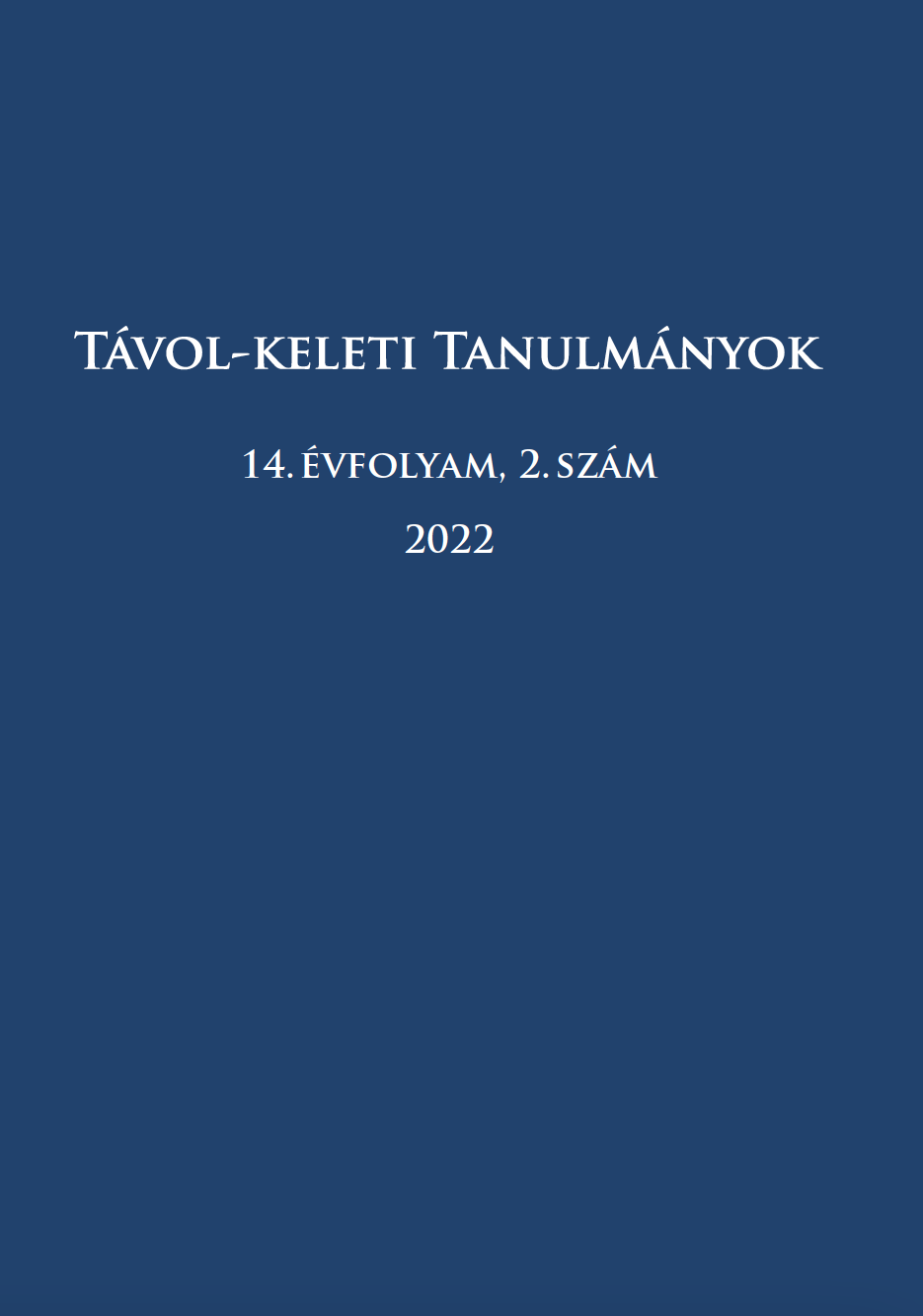Published 2022-12-06
Keywords
- Yukio Mishima,
- Anattā,
- anātman,
- Derrida’s philosophy,
- the meaning of meaning
- psychology of sexuality,
- aesthetics of Fascism,
- subject/object metaphysics,
- greek tragedy ...More
How to Cite
Copyright (c) 2022 András Kutor

This work is licensed under a Creative Commons Attribution-NonCommercial 4.0 International License.
Abstract
The Cartesian concept of the dualistic nature of meaning has frequently been criticized throughout the history of philosophy of language. The oeuvre of Mishima Yukio seems to reflect a kind of anti-Cartesian concept in the physicalism of its language, in the mode of narration and the mere script of Mishima’s stories as well. It seems obvious that at the very center of Mishima’s writings lay some kind of coherent metaphysical vision or phantasm, that can be clearly traced even in one of his earliest novels, Confessions of a Mask (1949). The main theme of Mishima’s writings was cruelty shaped in the manner of psychopathy, discussed in connection with a certain concept of subject/object metaphysics. This could be the reason why Mishima was so concerned with the disharmonic world-view of the archaic Greeks and their theory of tragedy, which shaped his aesthetics. But at the same time one may find that the particular metaphysical vision of Mishima according to a concept of meaning of words can be easily interpreted as the dogmatic meaning of anātman or non-self in Buddhism.
References
- Frege, Gottlob 2000. „Jelentés és jelölet.” In: Gottlob Frege: Logikai vizsgálódások. Válogatott tanulmányok. (Ford. Máté András.) Budapest, Osiris, 118–147.
- Husserl, Edmund 1972. „Fenomenológia.” In: Edmund Husserl: Edmund Husserl válogatott tanulmányai. (Ford. Baránszky Jób László, válogatta Vajda Mihály.) Budapest, Gondolat, 207–210.
- Jamamoto Cunetomo 2021, Hagakure. A szamurájok kódexe. (Ford. és szerk. Kárpáti Gábor Csaba.) Budapest, Szenzár.
- Mishima, Yukio 1972. “Death in Midsummer” In: Mishima, Yukio: Death in Midsummer and Other Stories. (Translated by Edward G. Seidensticker.) Penguin.
- Mishima, Yukio 1977a. Confessions of a Mask. (Translated by Meredith Weatherby.) Panther.
- Mishima, Yukio 1977b. The Way of the Samurai: Yukio Mishima on Hagakure in Modern Life. (Translated by Kathryn Sparling) New York, Basic Books.
- Misima Jukio 1998. Egy maszk vallomása. (Ford. Fázsy Anikó.) Budapest, Nagyvilág.
- Misima Jukio 2001. Hullámok sűrűjében. (Ford. Zimre Krisztina.) Budapest, Magyar Könyvklub.
- Misima Jukio 2006. Bevezetés a Hagakure szellemiségébe. (Ford. Tóth Andrea.) Budapest, Szenzár.
- Misima Jukio 2011. „Halál nyáron.” (Ford. Fázsy Anikó.) Nagyvilág : világirodalmi folyóirat. (Ford. Fázsy Anikó.) 56/7–8: 529–549.
- Misima Jukio 2018. Egy maszk vallomásai. (Ford. Gy. Horváth László.) Budapest, Jelenkor.
- Nathan, John 2000. Mishima – A Biography. Da Capo Press A member of the Perseus Books Group.
- Saussure, Ferdinand de 1997, „A nyelvi jel természete.” In: Ferdinand de Saussure: Bevezetés az általános nyelvészetbe. (Ford. B. Lőrinczy Éva.) Budapest, Corvina, 91–95.
- Scott-Stokes, Henry 1974. The Life and Death of Yukio Mishima, Farrar, Strauss and Giroux.
- Wilder, Thorton 1929. Szent Lajos király hídja. (Ford. Kosztolányi Dezső.) Budapest, Révai.
- Yamamoto, Tsunetomo 1979. Hagakure: The Book of the Samurai. (Translated by William Scott Wilson.) Kondansha International Ltd.
- Darida Veronika 2014. „A kegyetlenség melankóliája.” Élet és irodalom 58: 45.
- Fázsy Anikó 2000. „Mare Fecundiatis.” Nagyvilág: világirodalmi folyóirat 45/12: 1215–1218.
- Freud, Sigmund 1923. A halálösztön és az életösztönök. (Ford. Kovács Vilma. Előszó, fordítást átnézte Ferenczi Sándor.) Budapest, Világirodalom.
- Freud, Sigmund 1945, Egy illúzió jövője. (Fordította és bevezető jegyzetekkel ellátta Schönberger István.) Budapest, Bibliotheca.
- Freud, Sigmund 1982: „Rossz közérzet a kultúrában.” In: Freud esszék. (Fordította Linczényi Adorján.) Budapest, Gondolat Kiadó, 327–406.
- Keene, Donald 2003. Five Modern Japanese Novelists. New York, Columbia University Press.
- Koestler, Arthur 2007. Alvajárók. (Fordította Makovecz Benjámin, szakmailag ellenőrizte Gazda István.) Budapest, Európa.
- Lejeune, Philippe 2003. „Az önéletírói paktum.” In: Z. Varga Zoltán (szerk.): Önéletírás, élettörténet, napló. Budapest, L’ Harmattan, 17–46.
- Muramatsu Takeshi 村松剛 1990. Mishima Yukio no sekai 三島 由紀夫 の 世界 [’Mishima Yukio világa’]. Tokyo, Shinchosha.
- Nádas Péter 1990. „Misima-mondat” Holmi 2.5: 569–576.
- Parsons, William B. 1998. “The Oceanic Feeling Revisited.” The Journal of Religion 78.4: 501–523. https://doi.org/10.1086/490288
- Miller, Rory 2011. Facing Violence: Preparing for the Unexpected. (Edited by Karen Garr Grossmann.) Wolfeboro, YMAA Publication Center.
- Miller, Rory 2014. Szemtől szemben az erőszakkal: felkészülés váratlan helyzetekre, (Ford. Edelényi Gyula.) Budapest–Fót, Lunarimpex.
- Scott-Stokes, Henry 2000. “Epilogue.” In: Henry Scott-Stokes: The Life and Death of Yukio Mishima. Cooper Square Press, 259–282.
- Scott-Stokes, Henry 2001. „Öt. Utószó.” In: Henry Scott Scott-Stokes: Misima Jukio élete és halála. (Ford. Tóth Andrea.) Budapest, Szenzár, 269–294.
- Scott-Stokes, Henry 1974. The Life and Death of Yukio Mishima, Farrar, Strauss and Giroux.
- Starrs, Roy 1994. Deadly Dialectics: Sex, Violence, and Nihilism in the World of Yukio Mishima. University of Hawaii Press.
- Tsubaki, Andrew A. 1971. “Zeami and the Transition of the Concept of Yugen: A Note on Japanese Aesthetics.” The Journal of Aesthetics and Art Criticism XXX.1: 55–67. https://doi.org/10.1111/1540_6245.jaac30.1.0055

